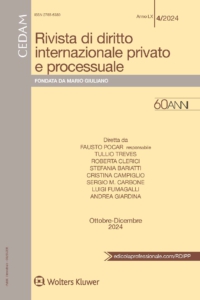Views
The EU Sustainability Directive and Jurisdiction
The Draft for a Corporate Sustainable Due Diligence Directive currently contains no rules on jurisdiction. This creates inconsistencies between the scope of application of the Draft Directive and existing jurisdictional law, both on the EU level and on the domestic level, and can lead to an enforcement gap: EU companies may be able to escape the existing EU jurisdiction; non-EU companies may even not be subject to such jurisdiction. Effectivity requires closing that gap, and we propose ways in which this could be achieved.
(authored by Ralf Michaels and Antonia. Sommerfeld and crossposted at https://eapil.org/)
- The Proposal for a Directive on Corporate Sustainability Due Diligence
The process towards an EU Corporate Sustainability Due Diligence Directive is gaining momentum. The EU Commission published a long awaited Proposal for a Directive on Corporate Sustainability Due Diligence (CSDDD), COM(2022) 71 final, on 23 February 2022; the EU Council adopted its negotiation position on 1 December 2022; and now, the EU Parliament has suggested amendments to this Draft Directive on 1 June 2023. The EU Parliament has thereby backed the compromise textreached by its legal affairs committee on 25 April 2023. This sets off the trilogue between representatives of the Parliament, the Council and the Commission.
No Sunset of Retained EU Conflict of Laws in the UK, but Increased Risk of Sunburn
By Dr Johannes Ungerer, University of Oxford
The sunset of retained EU law in the UK has begun: the Retained EU Law (Revocation and Reform) Act 2023 received Royal Assent at the end of June. The Act will revoke many EU laws that have so far been retained in the UK by the end of 2023.
The good news for the conflict of laws is that the retained Rome I and II Regulations are not included in the long list of EU legal instruments which are affected by the mass-revocation. Both Regulations have been retained in the UK post-Brexit by section 3 of the European Union (Withdrawal) Act 2018 and were modified by the Law Applicable to Contractual Obligations and Non-Contractual Obligations (Amendment etc.) (EU Exit) Regulations 2019 (as amended in 2020). The retained (modified) Rome I and II Regulations will thus be part of domestic law beyond the end of 2023. Yet this retained EU law must not be called by name anymore: it will be called “assimilated law” according to section 5 of the Retained EU Law (Revocation and Reform) Act 2023 (although the title of this enactment, like others, will strangely continue to contain the phrase “Retained EU Law” and will not be changed to “Assimilated Law”, see section 5(5)).
The CJEU on Procedural Rules in Child Abduction Cases: private international law and children’s rights law
Comment on CJEU case Rzecznik Praw Dziecka e.a., C-638/22 PPU, 16 February 2023)
Written by Tine Van Hof, post-doc researcher in Private International Law and Children’s Rights Law at the University of Antwerp, previously published on EU live
The Court of Justice of the EU has been criticised after some previous cases concerning international child abduction such as Povse and Aguirre Zarraga for prioritising the effectiveness of the EU private international law framework (i.e. the Brussels IIa Regulation, since replaced by Brussels IIb, and the principle of mutual trust) and using the children’s rights law framework (i.e. Article 24 of the EU Charter of Fundamental Rights and the principle of the child’s best interests) in a functional manner (see e.g. Silvia Bartolini and Ruth Lamont). In Rzecznik Praw Dziecka the Court takes both frameworks into account but does not prioritise one or the other, since the frameworks concur.
News
Rivista di diritto internazionale privato e processuale (RDIPP) No 4/2024: Abstracts
 The fourth issue of 2024 of the Rivista di diritto internazionale privato e processuale (RDIPP, published by CEDAM) was just released. It features:
The fourth issue of 2024 of the Rivista di diritto internazionale privato e processuale (RDIPP, published by CEDAM) was just released. It features:
Francesca C. Villata, Professor at the University of Milan, On the Track of the Law Applicable to Preliminary Questions in EU Private International Law [in English]
Silenced, if not neglected, in (most) legislation and practice, the issue of determining the law applicable to preliminary questions is a constant feature in the systematics of private international law (“p.i.l.”).
ELI Extra-Judicial Administration of Justice: 14 February in Vienna
The European Law Institute (ELI) Extra-Judicial Administration of Justice in Cross-Border Family and Succession Matters project is organising its dissemination conference in Vienna on 14 February. At this all-day event (9.00 to 18.00) experts will present their country reports, comparative findings and policy recommendations, in order to discuss these with the audience.
The project investigated the phenomenon that family and succession law matters are increasingly submitted to other authorities than courts. It seeks a to establish a harmonised concept of “courts” in the EU, taking into account the CJEU case law.
More information and the registration form are available on the ELI website.
Virtual Workshop (in English) on February 4: Pietro Franzina on “EU Private International Law at a Time of ‘Broken Multilateralism’ and Growing Geo-Political Tensions”

On Tuesday, February 4, 2025, the Hamburg Max Planck Institute will host its monthly virtual workshop Current Research in Private International Law at 11:00 a.m. – 12:30 p.m. (CET). Professor Pietro Franzina (Catholic University of the Sacred Heart) will speak, in English, about the topic
“EU Private International Law at a Time of ‘Broken Multilateralism’ and Growing Geo-Political Tensions”
Multilateralism is in crisis. The role of world organisations in international politics and law-making is increasingly being questioned, as some key actors in the global arena no longer consider cooperation and collective action the best way to address common concerns. While multilateralism is not obsolete, let alone ‘dead’, as some claim, there is a growing consensus that current governance schemes need profound reconsideration. The EU, multilateralism’s staunchest defender, is especially exposed to these developments. While the evolution of multilateralism is set to affect all areas of international cooperation, each field has, arguably, its specificities. What features does cooperation in the field of private international law display in this regard? How can the crisis of multilateralism influence the way in which the EU deals with judicial cooperation, be it through its legislation, in the relations with its neighbours and at the global level? What structural changes are under way in global fora, such as the HCCH, and what is their impact on the EU’s own agenda and methods of work?
The presentation will be followed by open discussion. All are welcome. More information and sign-up here.
If you want to be invited to these events in the future, please write to veranstaltungen@mpipriv.de.


